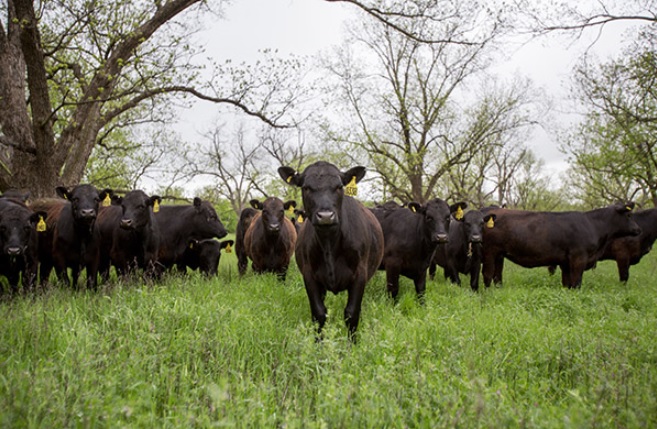By Samuel Roberts
 The Southern Great Plains has a comparative economic advantage in growing and managing forages for beef cattle production. Three categories of forage-based beef production systems that are common in this region include: 1) a cow-calf system that utilizes perennial native grass pastures, 2) a cow-calf system that utilizes introduced perennial pastures and 3) a stocker cattle system that utilizes annually established winter cereal forages. In the first two systems, weaned calves are supplied to the marketplace; in the third system, pounds of beef are supplied. Many variations of these three systems are being implemented on farms and ranches in the region. In fact, there are many producers who use one form or another of all three systems.
The Southern Great Plains has a comparative economic advantage in growing and managing forages for beef cattle production. Three categories of forage-based beef production systems that are common in this region include: 1) a cow-calf system that utilizes perennial native grass pastures, 2) a cow-calf system that utilizes introduced perennial pastures and 3) a stocker cattle system that utilizes annually established winter cereal forages. In the first two systems, weaned calves are supplied to the marketplace; in the third system, pounds of beef are supplied. Many variations of these three systems are being implemented on farms and ranches in the region. In fact, there are many producers who use one form or another of all three systems.
A number of issues can and oftentimes do impede the long-term economic success, and hence the long-term sustainability of the forage-based beef operations in the Southern Great Plains. Some common issues include, but are not limited to, overgrazing perennial pastures, continuous monocropping of annual pastures such as cereal wheat and rye, mismanagement of essential nutrients and soil additives (e.g., nitrogen, phosphorus, potassium and lime) on both perennial and annually established pastures, and the continuous use of intensive annual seedbed preparation and seed establishment techniques, to name a few. Some of these issues may seem trivial, but there are economic factors that help explain why these issues are present on farms and ranches in this region.
For instance, extended periods of favorable cattle prices can lead to extreme, prolonged periods of overgrazing (even in periods of drought) that cause severe and expensive damage to perennial forages. Overgrazing can also be the result of producers increasing their short-term cash flows that are needed to service annual payments due for long-term loans and property taxes, and to pay for family living expenses like health insurance premiums, groceries and the car payment for a spouse.
In another light, today's marketplace does not directly recognize – especially in the short run – the value of certain agroecosystem services (e.g., reductions in soil erosion, improvements in water infiltration, sequestered carbon) that can be obtained from the adoption of improved, technologically advanced forage establishment and management practices (e.g., cover crops, no-tilling, precision fertilizer and pesticide application, etc.). In particular, the market does not offer a specific unit price for a measured unit of soil erosion reduced. Benefits from using environmentally friendly practices accrue gradually over time in the form of greater yields, which translates into more revenue per acre in the future. These future benefits are expected to vary differently by operation and therefore can impede the adoption process.
Lack of credit is another factor that can hinder long-term sustainability. The lack of a good recordkeeping and financial management system can impede a farmer's access to credit, credit that is vital for the purchase of technology and equipment that may be necessary for long-term sustainability. Agricultural lenders are in the business of making loans to farmers, but lenders tend to be cautious about the terms for which they are willing to loan money to farmers. Farmers who have a good recordkeeping system tend to also have a well-developed, up-to-date set of financial statements (i.e., net worth statement, profit/loss statement and a statement of cash flows). These producers are typically much more successful in securing short-term operating loans and long-term loans for capital expenditures (tillage equipment, planters, land, fencing materials, breeding animals, etc.) than producers who do not have a financial management system for their farm or ranch business.
Click here to see more...